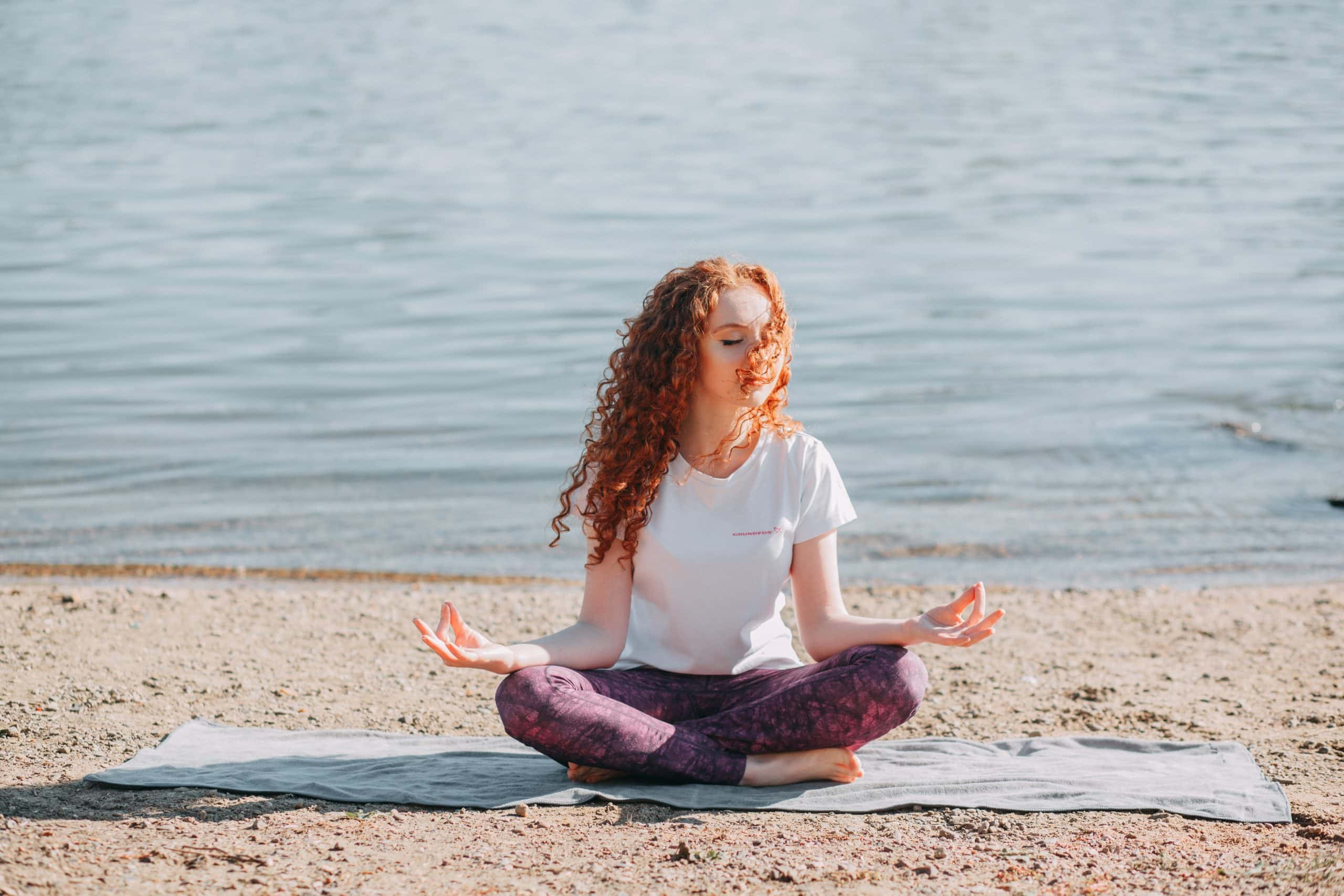In 2017, doctors found a tumor the size of a softball growing into my spine, pathologically fracturing the bone and compressing the L4 nerve. It affected my ability to walk, and, as a result, I spent almost six months confined to a very comfy couch. By the end of treatment, the lymphoma had disappeared, but my muscles just...weren't working.
I had no strength, energy, or hair. It was a pity party for one—but on my very last day of treatment, I decided to start yoga. And boy, did it change my road to recovery.
Finding My Breath
At first, I couldn't bend my knees and it was painful just to curl myself into the simplest of poses: balasana (child's pose). Even the shortest 10-minute beginner's class seemed laughably difficult. But within the first few weeks of daily practice, I noticed a remarkable difference in my energy levels and mood. The real gamechanger? Breathwork.
After spending so long lying horizontal, I hadn't realized how shallow my breathing had become. Synchronizing breath with movement was new to me—it was something that my physiotherapy sessions had never focused on. With the help of at-home yoga videos, I deepened my breathing and rebuilt all the strength I'd lost and more.
Now, five years later, I'm curious as to the science behind the curative practice that carried me up and away from cancer. What's the deal with yoga, and why does it work so well?
The Physical Benefits
Yoga, like many athletic activities, employs both the body and the mind. But of all its benefits, its physical ones are the easiest to prove. Not only does yoga support bone strength, but joint mobility and stability as well. When it came to my own recovery, this was increasingly apparent. My posture improved, and I regained enough balance that I no longer feared descending a set of stairs.
At the time, one of my legs was larger than the other—but yoga built my muscles in an astonishing way. Simply put, it evened me out. How? Well, the practice involves two essential types of activity: isotonic and isometric. With isotonic contractions, the length of the muscles changes while their tension remains uniform.
And then, to contrast that, there's isometric activity: holding still under a load. This can include asanas like warrior poses or balancing postures. At first, my affected left thigh couldn't hold its own weight. However, as long as I was consistent, holding simple poses every single day was all it took to build that strength. And that wasn't all.
Yoga As Therapy
Many people decide to try yoga in an effort to tackle one particular ailment: lower back pain. Even now, if I miss yoga for a couple of days, a dull ache will return to my lower back, where my dead tumor still resides. A 2013 systematic review looked into the use of yoga for this particular pain—and the evidence speaks for itself.
There were 10 trials, with eight of those having a low risk of bias. Their conclusions showed improvements in "pain, back-specific disability, generic disability, health-related quality of life, and global improvement." Basically, yoga is a beneficial form of therapy for patients suffering from chronic lower back pain. But the therapy goes beyond this.
Enter: the breath. To me, a newfound openness in my chest and lowered anxiety resulted from my yoga practice. When you breathe quietly and steadily, it slows your heart rate and decreases your blood pressure. This is what makes you feel so relaxed. In yoga, the method of breathing is called pranayama—and it can be used to calm or energize the body. In this way, I noticed a link between my yoga practice and my lower stress levels.
A Shift In My Mental Health
Yoga is not a cure-all for depression or PTSD—and more studies need to be done in order to assess its long-term effects. The evidence here is moderate as there's a lot to take into consideration—for instance, the severity of one's depression. However, the practice of yoga often supports the recovery of those struggling with their mental health.
In 2015, another systematic review investigated yoga's effect on mood and the brain. Its conclusion is as follows: "yoga is associated with better regulation of the sympathetic nervous system and hypothalamic-pituitary-adrenal system, as well as a decrease in depressive and anxious symptoms in a range of populations." Speaking for myself, I can only agree.
While undergoing cancer treatment, I faced on-and-off bouts of situational depression. Sometimes I was very optimistic, and other times, the daunting nature of rehabilitation felt endless. And then I started yoga. Compared to my weekly physiotherapy, the asanas allowed me to progress in leaps and bounds. My lung capacity increased and I no longer felt so darned sad.
Of course, not everyone agrees that yoga is as beneficial as most yogis claim.
Is It A Pseudoscience?
Skeptics like the neurologist Steven Novella latch on to the spiritual side of yoga and believe that its science is combined with "a liberal dose of pure pseudoscience and mysticism." Novella doesn't think it's any more beneficial than other forms of exercise, and can't condone many of yoga's unfounded claims. For instance, there's no proof that the lower back holds emotional stress, or that certain poses eject toxins from the body.
He seems to have a point. However, in my own experience, it is the spiritual components of the practice that enhance my overall feeling of wellbeing. The visualization of my stress makes a huge difference: Telling your brain that you are actively releasing disease, anxiety, negative thoughts—whatever it may be—plants you in a positive mindset. And for me, this positivity motivated me to return to the mat every day.
Going Forward
As a cancer survivor, my quality of life is significantly better because of this daily routine—and I wasn't surprised to discover that the American Cancer Society agrees. After a randomized controlled trial on breast cancer patients, the society concluded that, while it "cannot cure cancer," the practice of yoga yielded improved outcomes in depression, sleep quality, and fatigue.
To me, yoga was integral to my recovery and remains an essential part of my current lifestyle. So, does yoga work? Not for everyone. Did it work for me? Absolutely.
















